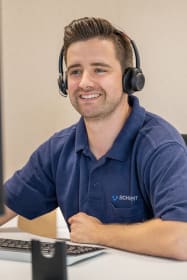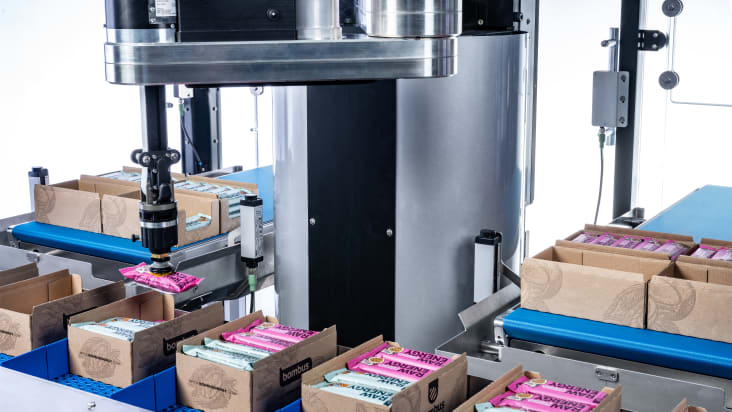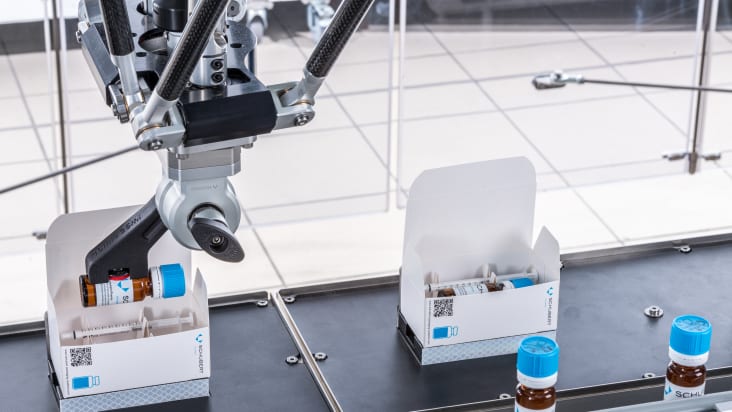Canadian Packaging magazine recently visited the busy 100,000 square-foot Vaughan facility to talk to Riverside’s Vice-President of operations, Justin Fluit and to Raphael Burkart, Project Manager at Schubert Packaging Automation. The Vaughan facility runs two shifts per day, six days a week. “Made Good is a brand that came out of nowhere to be everywhere,” describes Fluit, citing a strong retail base comprising more than 8,000 grocery stores across Canada, including the Costco chain of club stores, as well as growing list of clients in the foodservice, institutional and private label markets. “We are also building a strong brand presence online, especially during the COVID-19 pandemic,” Fluit says, noting that the company now sells a substantial portion of its output online through its website and other mainstream e-commerce channels, with specially designed pouches and cartons for shipping its products for home delivery.
As production volumes kept growing at a rapid pace, the Riverside plant found itself in need of high-throughput, high-speed automatic machinery to keep pace not just with the volumes, but also with the growing variety of different packaging formats required by its diverse customer base. Having had installed several vertical form-fill-seal machines to pack the free-flowing product into the different bag sizes at speed rates of up to 200 pieces per minute, the plant needed to find the right automatic secondary packaging system for placing those bags into the retail folding cartons at similar throughput speeds, with quick change - overs to accommodate all the varying packaging formats executed over the course of the shift. With multiple SKUs (stock-keeping units) often requiring for different product quantities and varieties of filled product pouches to be placed into all the different cartons to suit the customers’ varying requirements, superior speed and flexibility were naturally the two main capabilities that Riverside aimed to achieve through investment in packaging automation. “If we wanted to keep building the brands and enter the US market, we needed to be cost-competitive, we needed to be highly automated, we needed to have enough production capacity, and we needed to be able to scale up very quickly to respond to market demand,” Fluit explains.
After conducting a diligent market search and vendor evaluations, Riverside ultimately decided to go with the high-performance TLM (Top Loading Machine) picking and cartoning line by Schubert, which has been operating in Mississauga, Ontario, since 2006. “In addition to the state-of-the-art machinery Schubert showed us, I was really impressed by the level of the company’s commitment to the Canadian market,” says Fluit, describing the 2018 installation of the first of two Schubert TLM picking and cartoning lines at the Vaughan production facility to handle the soaring production volumes for the MadeGood brand products. “As a growing company with big plans for big future growth and expansion into new markets domestically and abroad, it was important to partner up with someone who would be there for us in terms of local service and support over the longterm,” Fluit explains.
Following a thorough discussion of Riverside’s application requirements, Riverside proceeded to order a TLM picking line by Schubert to perform the final packaging of flow-wrapped granola minis with packages of different flavors into a variety of carton sizes and in special bag formats. Programmed to pack five different flavors in four-, five and 28-bag boxes— each in one chosen flavor—the TLM line employs five identical pick-and-place robots to box 400 bags of MadeGood snack pouches per minute. The five different flavors can be intelligently pre-grouped—with the help of the Transmodul transport robot and an inline image recognition system—so that the granola minis can be automatically packed on the TLM machine. Different carton blanks are automatically taken out of the magazine, quickly erected by an F2 robot and glued together. The Transmoduls then swiftly transport the boxes to the next station, where five F4 pick-and-place robots fill them with the products. The TLM line is equipped with high-accuracy scanners that detect the orientation and position of the flowpacks over a width of 600 millimetres. This information is transmitted to the F4 pick-and-place robots for the correct pick-up and placement of the flow-packs in the boxes. The filled boxes are then transferred by a first F2 robot to a vacuum conveyor, and there closed by a second F2 robot in one step and placed on the outlet conveyor. For the special format packaging of the flow-packs into larger pouches, the scanner also recognizes the flavor based on product color. This enables the intelligent pre-grouping of granola minis with different flavours, which are supplied unsorted on the product belt. The flow-packs are pre-grouped in groups of four—each with two flavors— on the Transmoduls and transferred to the output conveyor by means of an F2 robot for further processing by Riverside. While the color recognition function for the pre-grouping of different flavours was not originally part of the machine order, Schubert was subsequently able to integrate this capability on-site in time to put the system into operation.





